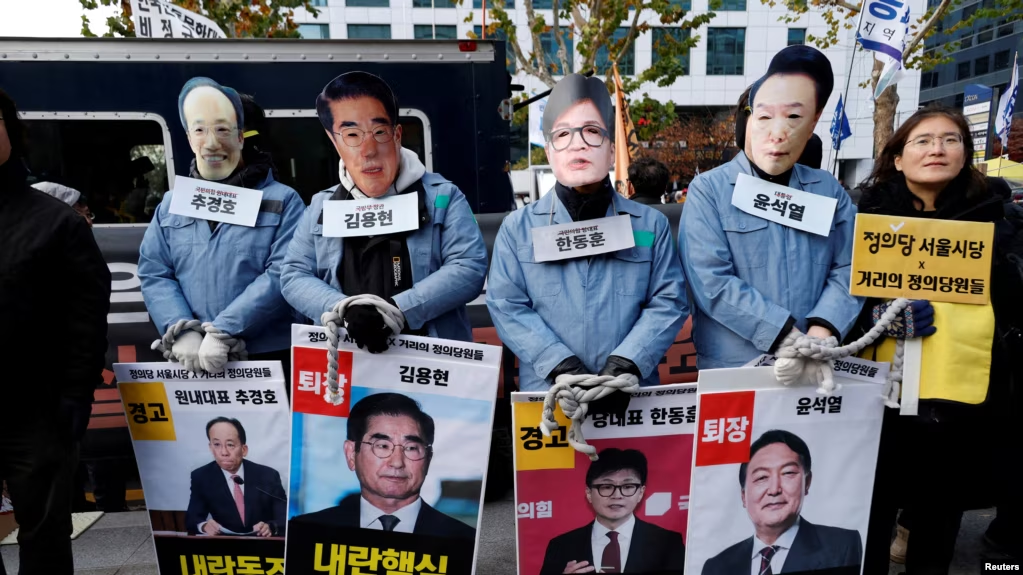South Korean prosecutors on Sunday (Dec 8) made emergency detention of former defence Minister Kim Yong-hyeon, who is seen as one of the main figures behind President Yoon Seok-yeol’s declaration of martial law last week.
According to Yonhap News Agency, Kim volunteered to appear at the Seoul Central District Prosecutor’s Office early Sunday for investigation. On Sunday morning, the special investigation office under emergency law announced the arrest of Kim and the confiscating of his mobile phone.
The special investigation office for emergency martial law believes that the civil unrest charge against Kim is a felony punishable by the death penalty, and that Kim may have colluded with related officials and destroyed evidence, so he meets the requirements of emergency detention.
Prosecutors also cited users who logged out of Telegram, the messaging app, and then logged back in, possibly to destroy evidence.
After the prosecutors announced the emergency detention of Kim, the National Investigation Headquarters of the South Korean National Police Agency searched Kim’s house, the Defense minister’s residence and his office to collect evidence.
Kim Yong-hyun was Yoon’s senior in high school. According to an impeachment document filed by opposition lawmakers, Mr. Kim recommended that Mr. Yoon impose martial law. Vice Defense Minister Kim Sun-ho said Mr. Kim also ordered the deployment of troops to parliament, adding that he did not know about martial law until it was declared.
Kim resigned the day after the brief martial law, and Yoon agreed a day later, naming a new defense minister.
Three minor opposition parties, the Workers’ Party of Korea, the Green Party and the Justice Party, have filed a lawsuit against President Yoon Seok-yeol, former Defense Minister Kim Yong-hyun, and former martial law commander and Army Chief of Staff Park An-Soo on charges of civil unrest. If convicted of leading civil unrest, they could face the death penalty or life imprisonment.
Prosecutors separately said Sunday that they had placed President Yoon Seok-yeol under investigation for alleged civil unrest.
South Korea’s ruling party says Mr. Yoon will no longer run state affairs
Mr. Yoon narrowly survived an oppression-led parliamentary vote to impeach him on Saturday night.
Han Dong-hoon, head of the People’s Power Party of Yoon Seok-yeol, held a news conference with Prime Minister Han Duk-soo on Sunday, saying that Yoon will no longer handle state affairs, including foreign affairs, to allay the concerns of the people and the international community.
Han also said that the president’s early resignation will be carried out in an orderly manner to minimize chaos to the nation and the people and stabilize the political situation. As the president will no longer intervene in state affairs, the party leader and the prime minister will have regular meetings more than once a week to prevent any gaps in state affairs.
South Korean Prime Minister Han Duck-soo said the cabinet would do its best to “maintain trust” with Allies. He was referring to the United States and Japan.
In addition, Minister of Public Administration and Security Lee Sang-min announced his resignation in a position paper on Sunday. Mr. Lee said he resigned because he felt “deeply that he failed to serve the public and the president dutifully,” the South Korean newspaper Joongang Ilbo reported. Resignation of South Korea’s presidential office.
Mr. Lee recently sparked controversy for comments that he made in support of martial law. The main opposition party, the Minjoo Party, has proposed the impeachment of Mr. Lee, which is scheduled to be voted on Dec. 10 in the National Assembly.
Mr Yoon stunned the country last Tuesday night when he issued emergency martial law, granting sweeping powers to the military to root out what he called “anti-state forces”. Six hours later, Congress voted against martial law, and he lifted it.
The emergency has plunged South Korea into its worst political crisis in decades, threatening the successful image of democracy in Asia’s fourth-largest economy and a key U.S. military ally.
